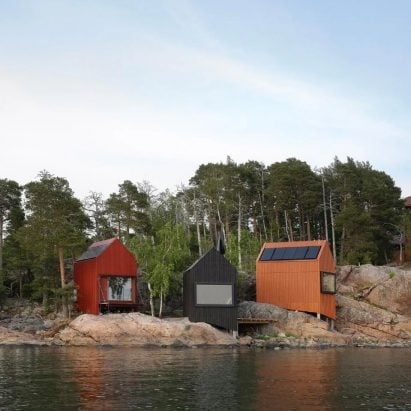Paris-based Littow Architectes has designed a group off-grid holiday homes on the coast in the Helsinki archipelago, Finland.
Named the Majamaja Off-Grid Village, the cabins are located on a rocky site on the water’s edge, which had little access to transportation infrastructure or public utilities.
Littow Architectes has designed a group of off-grid holiday homes
The retreat was developed by Majamaja, a Finnish brand specialising in providing off-grid living solutions, which was co-founded by Littow Architectes founder Pekka Littow.
Due to the inaccessibility of the site, the team created a prefabricated cabin that could be assembled on-site without heavy machinery.
The cabins are located in the Helsinki archipelago
The holiday homes were built with factory-made wooden frame structures, coupled with cellulose wool for thermal insulation.
“These structures are breathable and moisture-resistant, with no plastic films involved, allowing the Majamaja houses to remain unheated during the winter season if desired,” Littow told Dezeen.
They were prefabricated
At the heart of each cabin is an “all-in-one technology module” that the utility systems run on.
Rainwater and seawater are collected and purified for use through a customised purification system, while greywater can also be reused.
A dry toilet has been installed in each cabin, ensuring autonomy from the public sewage system. The technology module also stores solar and wind energy, which power the living areas of the cabin.
According to the brand, this technology module is internationally patented and will soon be available as a stand-alone product for other off-grid properties.
The cabins were built with factory-made wooden frame structures
“Majamaja is committed to sustainable land development in areas lacking infrastructure, minimising environmental damage associated with the pre-construction work like connecting to utilities and building roads,” the brand told Dezeen.
“This autonomy can reduce the environmental footprint by up to 80 per cent and significantly lower the pre-construction costs of a project.”
Fold-away furniture features in the interiors
Within the cabin, the interiors were designed to be space-saving, with most of the furniture being fold-away and multi-use.
“Adapting building technology to tight spaces introduces unique challenges, distinct from conventional construction,” explained Littow. Every inch of space must be optimised precisely.”
“The planning and manufacturing processes demand accuracy so that each element fits seamlessly on-site with minimal installation work,” he continued.
They each have coastal views
Littow hopes that Majamaja will serve as a model for a new era of off-grid thinking.
“Majamaja is a humble manifesto against high-rises and mega-construction efforts, which is what human beings often turn towards during economic booms,” he said.
“Things get easily out of hand, and the sense of proportion and scale is lost.”
The cabins are powered by an “all-in-one” technology module
Majamaja Off-Grid Village is shortlisted in the Small project category of this year’s Dezeen Awards.
Other off-grid projects recently featured on Dezeen include a rural farmhouse in Australia by Gardiner Architects and a cocoon-like timber cabin in England by Peter Markos.
The photography is by Joonas Linkola.
The post Littow Architectes creates collection of off-grid cabins on Helsinki archipelago appeared first on Dezeen.

